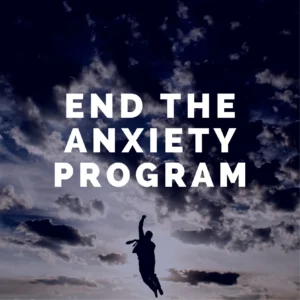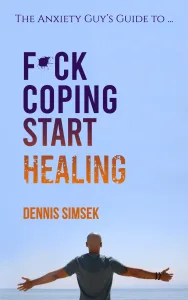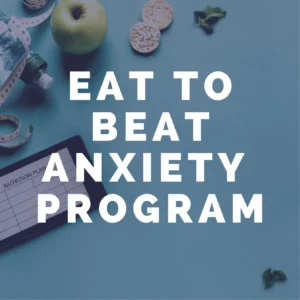Health Anxiety And The Pursuit Of Perfection
In our pursuit of perfection, we often trade peace for anxiety and joy for endless striving. It’s as if we’re caught in a never-ending cycle of “not good enough,” always pushing ourselves to be more, do more, and achieve more.1
Table of Contents

Today, I want to dive deep into the impact of this pursuit on your health anxiety levels. We’ll explore how perfectionism can fuel your anxiety, and what you can do to break free from this cycle.
The Hidden Dangers of Over-Pursuing Perfection
Most people don’t change until they’ve suffered enough. I know I didn’t, at least not until I’d gone through a bit more suffering than I care to remember! Around the age of 32, something shifted for me. I gave myself permission to be.
These two words – “permission to be” – are incredibly important. They mean that if something doesn’t align with your perfectionist pursuit, you can let it go. You don’t have to continue down a path of imperfection, always striving to be better.2
The Problem with Perfectionism
When we’re driven by the need for perfection, our bodies often respond with a “0.1% is off” kind of thinking. That tiny imperfection becomes magnified in our minds, triggering catastrophic thinking and emotional distress. As you know all too well, this can lead to a state of fight or flight that affects not just your body but also your entire perceptual system.3
The anxious mind believes that increased effort equals increased care – but this is a flawed perspective. By constantly striving for perfection, we’re actually doing more harm than good. We’re conditioning ourselves to believe in the magnified perceptions that are causing our anxiety, rather than facing the root causes of our suffering.
Breaking Free from the Cycle
So, how do we break free from this cycle? It starts with decreasing effort and increasing allowing. When we allow things to unfold naturally, without forcing them into a certain shape or mold, we begin to let go of tension and stress. We start to see that less effort can equal increased care – not just for our bodies but also for our minds.4
This is the permission to be I spoke about earlier. It’s about recognizing that it’s okay to let things unfold without constant intervention from us. And when we do this, something remarkable happens: we start to trust more and look to change things less.
The Key to Reversing Health Anxiety
So, how do we start decreasing effort and increasing allowing? It’s not about suddenly changing our entire approach overnight. It’s a process that takes time, patience, and self-awareness.
One key is to trust more and look to change things less. When you’re faced with a situation where you want to “fix” something or make it better, try using the phrase “so what?” or giving yourself permission to be. This simple shift in perspective can help you move away from constant striving and towards a more relaxed, allowing approach.
Another key is to get comfortable with a state of non-doership. I know this might sound strange at first, but it’s about embracing the idea that sometimes we don’t have all the answers or need to take action right now. It’s okay to just be, without needing to “fix” or “improve” everything.
This approach is not just about health anxiety; it’s about living life in a more relaxed, easeful way. When you’re no longer constantly striving for perfection, you start to see that life unfolds naturally and beautifully, without the need for constant control or intervention.
The Four Keys to Breaking Free
Based on my experience and the lessons I’ve learned from working with clients, there are four key steps to breaking free from the cycle of health anxiety:
- Decrease effort and increase allowing: As we discussed earlier, this is about moving away from constant striving for perfection and towards a more relaxed, allowing approach.
- Trust more and look to change things less: This is about trusting that life will unfold naturally and beautifully, without the need for constant control or intervention.
- Get comfortable with non-doership: This means embracing the idea that sometimes we don’t have all the answers or need to take action right now. It’s okay to just be!
- See yourself as stepping out of who you thought you needed to be: This is about recognizing that your old, anxious self is not the same person you are today. You’ve grown and evolved, and it’s time to let go of the old patterns and habits that no longer serve you.
I hope these four keys resonate with you, my friend. Remember, breaking free from health anxiety takes time, patience, and self-awareness – but it is possible!
The Final Key: Love Your New Approach
As you begin to break free from the cycle of health anxiety, I want to encourage you to love your new approach. This means embracing the ease, trust, and clarity that comes with letting go of constant striving for perfection.5
Remember, you don’t have to do everything perfectly all the time. You can leave your symptoms alone, leave your feelings alone, and even leave those catastrophic ideas alone! When you start believing in this new state of being, it becomes as automatic as your anxiety once was – but now it’s a positive, empowering force that guides you towards health, happiness, and freedom.
I hope this blog post has been helpful, my friend. If you have any questions or comments, please don’t hesitate to reach out.
Conclusion
In conclusion, my friend, I want to say that breaking free from health anxiety is possible. It takes time, patience, and self-awareness – but it’s worth it! By decreasing effort and increasing allowing, trusting more and looking to change things less, getting comfortable with non-doership, and seeing yourself as stepping out of who you thought you needed to be, you can break free from the cycle of health anxiety and live a life that’s truly yours.
Remember, my friend, you are not alone. You are not just your symptoms or your feelings; you are a strong, capable person who deserves to live a happy, healthy, and fulfilling life.
Citations
- Perfectionism and Anxiety Source: Psychology Today Link: Psychology Today Article ↩︎
- Understanding Perfectionism and How It Can Affect Your Well-being Source: BetterUp Link: BetterUp Article ↩︎
- The dangerous downsides of perfectionism Source: BBC Link: BBC Article ↩︎
- The Pros and Cons of Perfectionism, According to Research Source: Harvard Business Review Link: Harvard Business Review Article ↩︎
- Perfectionism and Anxiety: Why They’re Linked and Ways to Cope Source: Psych Central Link: Psych Central Article ↩︎




